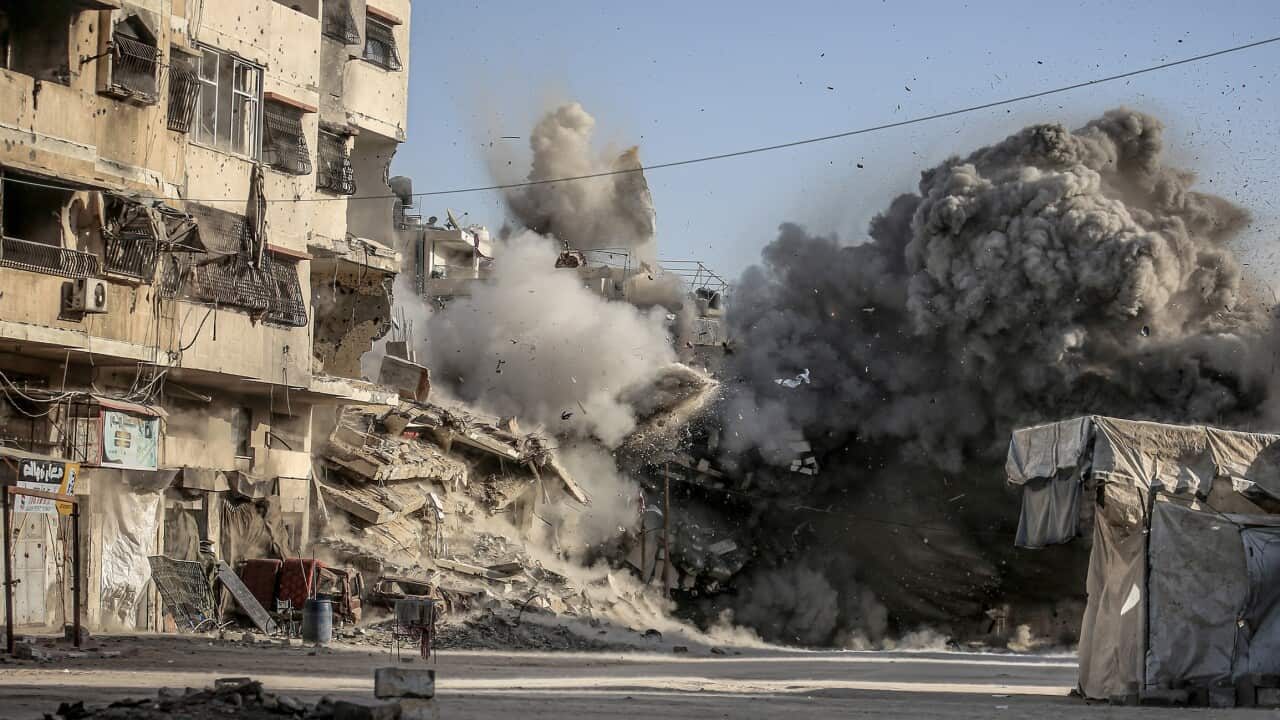Hopes for peace in Gaza are growing after Hamas accepted parts of a United States-brokered plan, but some experts say the militant group's "ambiguous" response leaves major questions about what comes next.
Hamas has approved specific elements of the plan, such as ending the conflict, Israel's withdrawal, the exchange of Israeli hostages for Palestinian captives, providing aid and recovery assistance, and opposing the expulsion of Palestinians from the territory.
A senior Hamas official said Saturday the group was "ready to begin negotiations immediately to finalise all issues".
US President Donald Trump responded to Hamas' statement by saying he believes the group is "ready for a lasting peace".
However, experts warn that major sticking points remain, and an inability to resolve them risks upending the agreement.
Hostage-prisoner exchange 'highly likely'
Anas Iqtait, senior lecturer at the Australian National University (ANU), told SBS News that it's "highly likely" that Israel and Hamas will go through with the hostage-prisoner exchange.
According to Trump's plan, all hostages, alive and deceased, will be returned within 72 hours. Following that, Israel will release 250 life-sentence prisoners and 1,700 Gazans detained after October 7, including women and children.
For the remains of each Israeli hostage released by Hamas, Israel will release the remains of 15 deceased Gazans.
Iqtait said both Hamas and Israel are likely to go through the hostage-prisoner exchange due to the "immense pressure" on both sides.
"There is intense international pressure as well as public scrutiny at the international level for Israel, about what Israel has been doing in Gaza — this has put Israel, obviously, under immense international pressure [to stop its attacks in Gaza]," he said.
"Israel is also under immense pressure from the White House, at least for the first stages of this agreement," Iqtait said.
He said that while Israel was largely responsible for the ongoing humanitarian catastrophe in Gaza, it had also put Hamas, as the governing entity in Gaza, under "immense pressure".
Hamas was also likely to feel pressure from neighbouring Arab states such as Egypt, Jordan, Qatar — as well as Muslim majority countries such as Türkiye, Pakistan and Indonesia — coming out "very forcefully" in support of the plan, he added.
However, Iqtait and other experts were far less confident about other aspects of the peace plan.
The governance of Gaza
The Trump peace plan calls for Gaza to "be governed under the temporary transitional governance of a technocratic, apolitical Palestinian committee", which would be supervised by a new international transitional body led by Trump.
Hamas has said it approves of handing over "the administration of the Gaza Strip to a Palestinian body of independents (technocrats) based on Palestinian national consensus and with the support of Arab and Islamic nations".
However, it has not commented on the plan for the committee to be supervised by an international body and has said it should be "included and will contribute" to any Palestinian national discussion on Gaza's future.
Iqtait said the political aspects of the plan are "very ambiguous" and he's "not very optimistic about them being implemented as they were communicated in the plan".
"The future of governance in Gaza is something that is still unclear. Obviously, there is immense disagreement about the way that Trump proposed the future of Gaza."
While the plan calls for Gaza to be considered as an independent political entity, "Gaza is part of the wider Palestinian context," Iqtait said.
Disarmament 'a major sticking point'
Ian Parmeter, research scholar at the Centre for Arab and Islamic Studies at the ANU, said the plan's requirement for Hamas to disarm would "remain a major sticking point".
"Because the other side of this particular equation is that Netanyahu has to satisfy the right-wing members of his cabinet that essentially all of Israel's war aims have been achieved," he told SBS News, specifically citing the aim that Hamas no longer poses a threat to Israel.
"[Disarmament] will have to be resolved fairly soon, or else we could be headed back to a full-scale war again, and particularly as soon as the hostages have got out," Parmeter said.
Emily Crawford, a professor of international law at the University of Sydney, also told SBS News that a failure to disarm by Hamas "could upend the peace agreement".
She said that, while Hamas had not immediately agreed to disarm, it had "seemed to indicate willingness to negotiate towards that end".
AFP has recently cited a source close to Hamas' leadership as saying that Hamas officials were seeking amendments to the disarmament clauses.
A senior Hamas official told Al Jazeera that the group would not disarm before Israel's occupation of the enclave ends.
'Cautiously hopeful'
Crawford also said that Israel continuing "to bomb Gaza" could also undo the agreement, adding that "Netanyahu has repeatedly condemned any conciliatory moves towards Palestine and has been unwilling to countenance any ceasefire".
Gaza's civil defence agency said on Saturday that Israel had carried out dozens of airstrikes and artillery shelling on Gaza City despite calls from the families of Israeli hostages and Trump for an immediate halt to the fighting.
The Israeli military said it was operating in Gaza City and urged residents not to return.
Netanyahu's office has said Israel "will continue to work in full cooperation with the president and his team to end the war in accordance with the principles set out by Israel, which align with President Trump's vision".
"Whether this agreement holds, it's hard to say — history would suggest no, given the decades of violence in the region," Crawford said.
"But equally, there have been other seemingly intractable conflicts that have been negotiated to peace, so I remain cautiously hopeful."
— With additional reporting by Reuters
For the latest from SBS News, download our app and subscribe to our newsletter.

